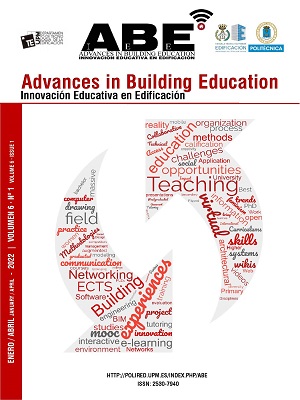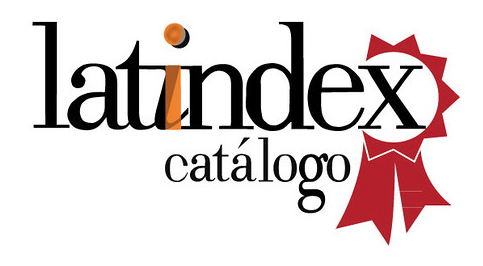Analysis of the spatial skills of the degree student in engineering: A gender approach
DOI:
https://doi.org/10.20868/abe.2022.1.4810Keywords:
Spatial Skills, Gender, University Students, EngineeringAbstract
The objective of this work is to carry out an approach to the study of spatial skills by gender in engineering students. For this, the analysis of a test consisting of 12 questions was carried out on a sample of 220 students from the Universidad Politécnica de Madrid, of which 134 were male and 81 were female. The study evaluated three different types of spatial skills such as relation, rotation, and visualization. From the analysis of the results obtained in the sample, it appears that in engineering degree courses the difference between men and women in terms of spatial ability is not significant, with other variables such as the university degree carried out by the sample showing a greater statistical association.Downloads
References
Ogunkola, B. y Knight, C. "Does technical drawing increase students' mental rotation ability?", Cogent Education, 5, 2018. https://doi.org/10.1080/2331186X.2018.1489209
Spence, I. y Feng, J., "Video Games and Spatial Cognition". Review of General Psychology, 14 (2): 92-104, 2010 https://doi.org/10.1037/a0019491
Nagy-Kondor, R., "Gender differences in spatial visualization skills of engineering students". Annales Mathematicae et Informaticae, 46: 265-276, 2016.
Lohamn, D., "Spatial Ability: a review and reanalysis of the correlational literature". Aptitude research project, School of Education, Stanford University, 1979.
Linn, M. C. y Petersen, A. C., "Emergence and characterization of sex differences in spatial ability: a meta-analysis". Child Development, 56 (6): 1479-1498, 1985. https://doi.org/10.2307/1130467
Ecuyer-Dab, I. y Robert, M., "Have sex differences in spatial ability evolved from male competition for mating and female concern for survival?". Cognition, 91: 221-257, 2004. https://doi.org/10.1016/j.cognition.2003.09.007
Arrieta, I. y Medrano, M. C., "Un análisis de la capacidad espacial en estudios de ingeniería técnica". PNA, 9 (2): 85-106, 2015. https://doi.org/10.30827/pna.v9i2.6104
Villa Sicilia, A., Desarrollo y evaluación de las habilidades espaciales de los estudiantes de ingeniería. Actividades y estrategias de resolución de tareas espaciales. Tesis doctoral. Universitat Politècnica de Catalunya, Departament D'Expressió Gràfica a l'Enginyeria, 2016.
Sorby, S. A., "Educational research in developing 3-D Spatial Skills for Engineering Students". International Journal of Science Education, 31 (3): 459-480, 2009. https://doi.org/10.1080/09500690802595839
Maeda, Y. y Yoon, S. Y., "A meta-analysis on Gender Differences in Mental Rotation Ability Measured by the Purdue Spatial Visualization Tests: Visualization of Rotations (PSVT:R)". Educational Psychology Review, 25: 69-94, 2013. https://doi.org/10.1007/s10648-012-9215-x
Subirats, M. y Tomé, A. Balones fuera. Reconstruir los espacios desde la coeducación. Ediciones Octaedro, Barcelona, 2007
Varela, N., Feminismo para principiantes. Ediciones B, Barcelona (2013)
Stumpf, H. y Eliot, J., "Gender-related differences in spatial ability and the k factor of general spatial ability in a population of academically talented students". Personality and Individual Differences, 19 (1): 33-45, 1995. https://doi.org/10.1016/0191-8869(95)00029-6
Shepard, R. N. y Metzler, J., "Mental rotation of three-dimensional objects". Science, 171 (3972): 701-703, (1971) https://doi.org/10.1126/science.171.3972.701
Sánchez García, V., "Diferencias de sexo y el aprendizaje de las matemáticas". SUMA, 14/15: 18-24, 1994
Burin, D., Delgado, A. y Prieto, G., "Solution strategies and gender differences in spatial visualization tasks". Psicológica, 21: 275-286, 2000.
Barry, S., "Sex differences in mental rotation and spatial visualization ability: Can they be accounted for by differences in working memory capacity?". Intelligence, 35, 211-223. DOI: 10.1016/j.intell.2006.07.009., 2007. https://doi.org/10.1016/j.intell.2006.07.009
Fontaine, M., De Rosa, A. J. y Metz, S. S, "A first-year engineering spatial skills workshop: implementation, effectiveness and gender differences". American Society for Engineering Education (ASEE), 2019.
Downloads
Published
Issue
Section
License
ABE (Advances in Building Education / Innovación Educativa en Edificación) does not charge authors for processing or publishing an article and provides immediate Open Access to its content. All content is available free of charge to the user or his institution. Users are permitted to read, download, copy, distribute, print, search or link to the full text of articles, or use them for any other lawful purpose, without prior permission from the publisher or author. This is in accordance with the BOAI definition of open access.
- Authors retain the copyright and grant to the journal the right to a Creative Commons attribution / Non-Commercial / Non-Derivative 4.0 International (CC BY NC ND) License that allows others to share the work with an acknowledgement of authorship and non-commercial use.
- Authors may separately establish additional agreements for the non-exclusive distribution of the version of the work published in the journal (for example, placing it in an institutional repository or publishing it in a book).
Unless otherwise indicated, all contents of the electronic edition are distributed under a Creative Commons license.














